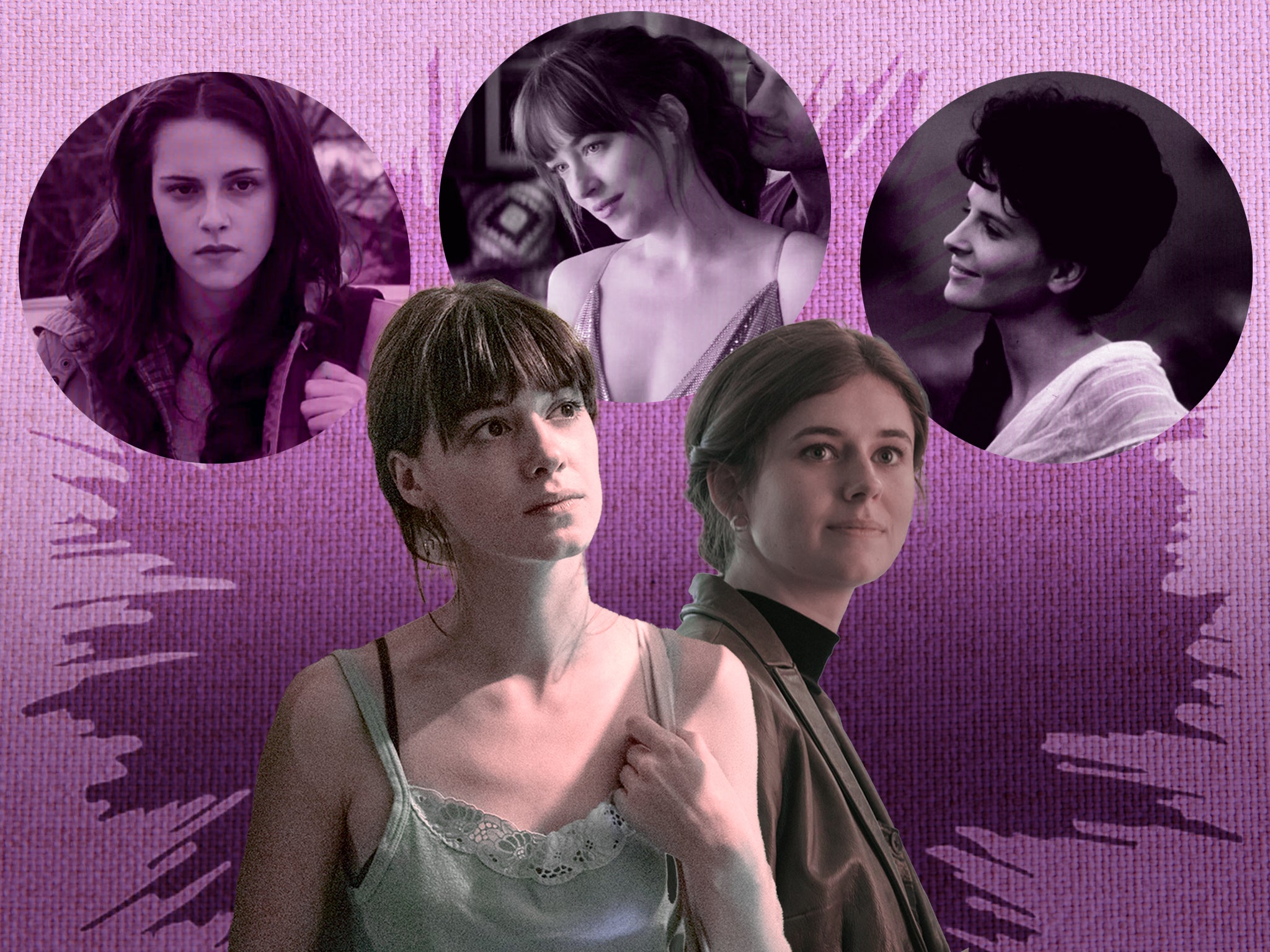Waif Girl: How Sally Rooney, EL James and Stephenie Meyer are behind one of the most insufferable character tropes
In contemporary culture, the ‘Waif Girl’ is a barrel of contradictions: normal but extraordinary, socially awkward but the centre of attention, drab but hot, sexless but sexy, virginal but seductive. Roisin O'Connor unpacks the origins of the character and why she’s become so problematic


Your support helps us to tell the story
From reproductive rights to climate change to Big Tech, The Independent is on the ground when the story is developing. Whether it's investigating the financials of Elon Musk's pro-Trump PAC or producing our latest documentary, 'The A Word', which shines a light on the American women fighting for reproductive rights, we know how important it is to parse out the facts from the messaging.
At such a critical moment in US history, we need reporters on the ground. Your donation allows us to keep sending journalists to speak to both sides of the story.
The Independent is trusted by Americans across the entire political spectrum. And unlike many other quality news outlets, we choose not to lock Americans out of our reporting and analysis with paywalls. We believe quality journalism should be available to everyone, paid for by those who can afford it.
Your support makes all the difference.Everybody suffers,” says Frances, the wispy protagonist of Sally Rooney’s debut novel, Conversations with Friends. True, but does anyone suffer quite like Rooney’s female characters? In recent years, popular culture has seen the emergence of a trope that has its roots in classic literature, but is about as far removed from those early characters as it’s possible to be. She is Waif Girl: a tormented young woman who can’t help but question why anyone bothers with anything at all.
The Waif Girl in literature has been around much longer than Frances, but 170 years ago she had substance. In Wuthering Heights she was Cathy, roaming the moors with Heathcliff, as wild and violent as the nature that surrounded her. Emily Brontë’s sister, Charlotte, wrote a Waif Girl in the form of Jane Eyre – quieter and more timid than Cathy, but just as radical in her independence of thought. Thomas Hardy’s Tess of the d’Urbervilles sought to fight for her own life and the lives of others, despite suffering unfathomable hardships.
Charles Dickens was good at waifs, too, the obvious being Oliver Twist, Jo the crossing sweeper in Bleak House, and Pip in Great Expectations. I always think of Estella – the orphan raised by Miss Havisham to return the desperate attentions of men with nothing but coldness – as the best of them. In the Sixties, “the waif look” was applied to models such as Twiggy and Edie Sedgwick (Sedgwick’s tortured personal life makes the waif moniker particularly apt), along with actors including Audrey Hepburn and Leslie Caron. In films such as Gigi, Caron emulated the wilful, spirited character of her predecessors, as did Hepburn as the eccentric Holly Golightly in Breakfast at Tiffany’s. During the Eighties and Nineties, the Waif Girl rose again in Winona Ryder (Bram Stoker’s Dracula, Little Women, and Girl, Interrupted).
In recent years, however, the Waif Girl has returned to pop culture with a new, more troubling and ultimately insufferable identity. While the new incarnations may not technically be orphaned, their parents are either estranged, separated or absent, so they just about fall into the original “waif” definition. The similarities stop there. Waif Girl in contemporary film, TV and literature is a barrel of contradictory tropes: she is “painfully skinny” but still attractive; she insists she is boring but still succeeds in fascinating those around her; she is normal but extraordinary (for no clear reason); smart without trying (but never a geek, as much as she might claim to be); socially awkward but the centre of attention; drab but hot; sexless but sexy; virginal but seductive.
Among the most prominent examples are Twilight’s Bella Swan, After’s Tessa Young, Fifty Shades of Grey’s Anastasia Steele, Normal People’s Marianne Sheridan, and Conversations with Friends’s Frances. Despite their perception of themselves as outcasts, they are frequently among the most privileged of social groups: white, thin, educated, wealthy (or supported by someone who has wealth), cis and (mostly) straight. She’s the introverted counterpoint to “Cool Girl”: the beer-guzzling, pizza-eating chick of How I Met Your Mother and There’s Something About Mary fame. Cool Girl was skewered in Gillian Flynn’s 2012 thriller Gone Girl, but Rooney and co’s characters lean right into Waif Girl’s most problematic traits.
The level of martyrdom of Rooney’s lead female characters has been described as “gratuitous”. Indeed, across the board, Waif Girls are desperate to convince you and their love interests of their total unworthiness. They compare themselves constantly in a negative manner to other characters: Frances’s friend Bobbi has “better posture” than her and “a memorably beautiful” face. “It doesn’t make sense for you to love me,” Bella (Kristin Stewart) insists to her vampire beau, Edward Cullen (Robert Pattinson), in the film adaptation of Twilight: New Moon. “I’m nothing… human… nothing.” In a later scene, she begs Michael Sheen’s giggling Aro to kill her instead of Edward, convinced his life is worth more. “I don’t think I’d fit in here,” Dakota Johnson, regularly ranked among the sexiest women in the world, whispers to Jamie Dornan’s Christian Grey, when he offers her an internship at his billion-dollar firm. “Look at me.”
For Marianne in Rooney’s second novel Normal People, her life doesn’t even begin until Connell falls for her: “She has never believed herself fit to be loved by any person. But now she has a new life, of which this is the first moment, and even after many years have passed she will still think: Yes, that was it, the beginning of my life.” Frances says something similar in Conversations with Friends: “Maybe having him witness how much others approved of me, without taking any of the risks necessary to earn Nick’s personal approval, made me feel capable of speaking to him again… as if there was nothing inferior about me.”
The term “waif” originally referred to a person removed from their familiar surroundings by hardship or loss. Most often they were orphaned children, with no home or friends. In literature by the Brontës, Dickens or Hardy, that strife was what motivated them. This is replicated for Waif Girls in contemporary literature but, unlike their forebears, they rarely want for anything financially. Bella’s vampire in-laws are loaded; Anna marries a billionaire; Marianne’s family is rich; Frances’s father gives her money. By removing any financial concern – perhaps due to misplaced fears this would bore their readers – the authors allow their characters to engage in their romantic endeavours without worrying who’s going to pay for dinner. Not that they’re planning on eating anything, of course.
The male love interests of Waif Girls are obsessed with what they eat and drink. “Have you been drinking?” Christian demands when Anna calls him from a club. Later: “You should eat something.” In Grey, the book written from Christian’s perspective published in 2015, the obsession is even more evident. He fantasises about her “slight” frame and “delicate” features, but spends much of their relationship either insisting she eat or telling her she doesn’t eat enough. Both Marianne in Normal People and Frances in Conversations with Friends seem to have undiagnosed eating disorders: Marianne has a “small” appetite for a whole summer and notices vaguely one day that she hasn’t eaten breakfast or lunch. Frances has difficulty writing poetry after eating toast then, having not eaten a proper meal in days, produces some of her best work.

Watch Apple TV+ free for 7 days
New subscribers only. £8.99/mo. after free trial. Plan auto-renews until cancelled

Watch Apple TV+ free for 7 days
New subscribers only. £8.99/mo. after free trial. Plan auto-renews until cancelled

Despite these young women being depicted as unusually intellectual (often their authors meta-reference their love of books by Austen, Hardy and Brontë as proof of this, along with their romantic tendencies), they are astonishingly inarticulate. “I tend to write characters who are roughly as articulate and insightful as I am about what they think and feel,” Rooney told The New Yorker in 2019. “In other words, they are sometimes perceptive but more often crushingly unable to describe or explain what is going on in their lives.”
She wasn’t kidding. Marianne and Connell break up over the most mundane misunderstanding possible (she assumes he’s dumping her when he was actually going to ask if he could crash at her place for the summer holidays). Similarly, Edward and Bella split in the second book because he wants to protect her – only she ends up suicidal because she’s convinced he’s realised she isn’t worthy of him. Frances and Nick’s first proper encounter in Conversations with Friends is mostly spent apologising to each other for saying something “stupid”, despite never being told that was the case.
Some fans have found the tropes in Rooney’s work so ludicrous that they’ve parodied them on social media. “Skinnily, I sadly and hotly forgot to eat for seven days and I only realised when I fell over in front of Trinity College and everyone was worried about me,” Twitter user @corsie101 wrote in her viral 2020 tweet. “Then a horrible man fed me something and we had sex. It felt good, and bad.” On YouTube, a sketch from The Lazy Susan Show parodies a Lana Del Rey song, with a girl group chanting: “Being tired is a lifestyle.” But more often than not, you can get some laughs out of reading the real thing. “I realised my life would be full of mundane physical suffering, and that there was nothing special about it,” Frances thinks. “Suffering wouldn’t make me special, and pretending not to suffer wouldn’t make me special. Talking about it, or even writing about it, would not transform the suffering into something useful.” And yet here we are, suffering along with her.



Join our commenting forum
Join thought-provoking conversations, follow other Independent readers and see their replies
Comments